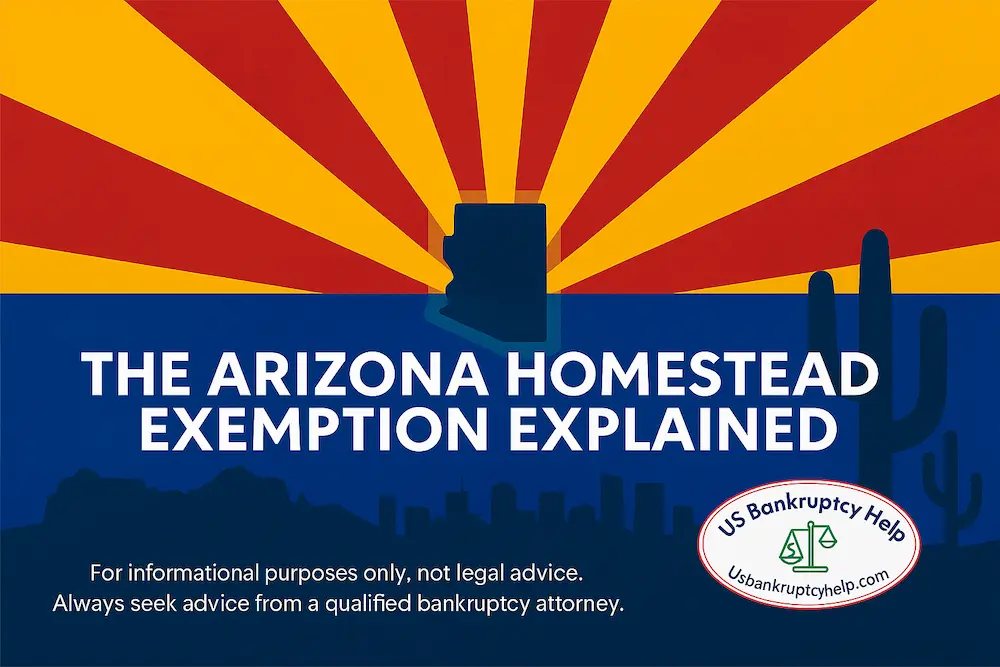

The Arizona Homestead Exemption and Bankruptcy: Protect Your Home
If you’re a homeowner in Arizona, your home is probably one of your most important assets. If you’re considering filing bankruptcy, understanding Arizona’s homestead exemption can be a game-changer. This exemption is designed to protect home equity from many unsecured creditors when financial stress hits.
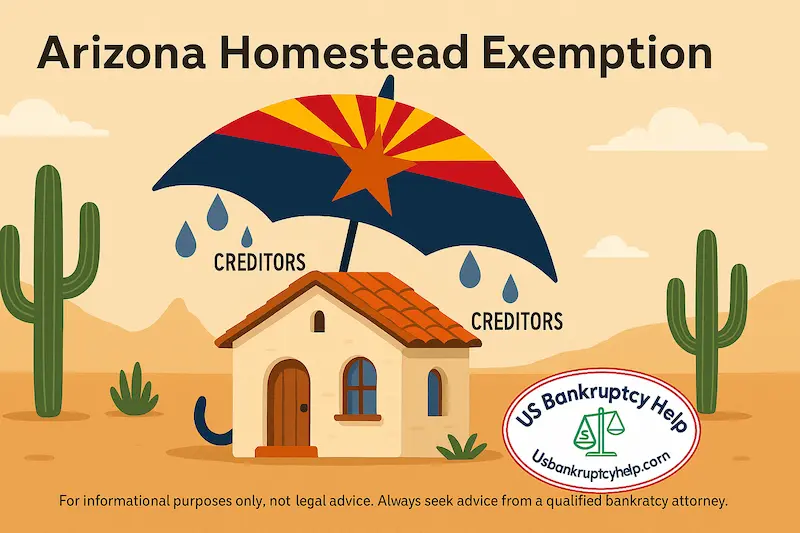
The exemption applies to your primary residence. Whether it's a house, condo, or mobile home, it can be protected. This ensures your home remains secure from unsecured debts.
Arizona Homestead Laws are Generous
Arizona homestead laws are among the most generous in the U.S. They reflect Arizona's commitment to safeguarding property rights. This protection is vital for financial stability and peace of mind. Staying informed about these laws is essential. Changes can occur, impacting your financial planning. Understanding these benefits can help you make informed decisions about your home and equity.
Arizona Homestead Exemption — At a Glance
Quick reference only — amounts and rules change; verify current law before filing.
- Amount & Property Type: Protects up to $425,000 of equity in your primary residence (house, condo, mobile/manufactured home on owned land) — automatic protection under A.R.S. § 33-1101.
- Who Can Use It: To use Arizona exemptions, you must have lived in AZ at least 730 days (2 years) before filing (11 U.S.C. § 522(b)(3)(A)).
- Recent Purchases (1,215-Day Cap): If you bought the home within 1,215 days of filing, federal law may cap how much homestead you can claim, even if AZ’s limit is higher (11 U.S.C. § 522(p)).
- Sale Proceeds: Proceeds from selling a homestead are generally protected for up to 18 months if you intend to reinvest in another primary residence and keep the funds traceable/separate (A.R.S. § 33-1101(C)).
- What It Doesn’t Stop: Mortgages/deeds of trust, HOA liens, tax liens, and other secured claims can still be enforced. Homestead mainly protects against unsecured creditors.
- Equity Math: Equity = fair market value − all liens. If equity ≤ the indexed cap, it’s generally protected.
- Chapter 7 vs. Chapter 13: In chapter 7, non-exempt equity can put the home at risk; if fully exempt and payments are current, you usually keep it. In chapter 13, you typically keep the home and pay any non-exempt equity through a 3–5 year plan.
- Paperwork: Protection is typically automatic; recording a Homestead Declaration isn’t required, but can help in unusual situations.
What is the Arizona Homestead Exemption?
The Arizona homestead exemption is a primary Arizona bankruptcy exemption that shields a portion of your home's equity from creditors. This means that if you fall into debt and face bankruptcy or a lawsuit, creditors may not force the sale of your home to satisfy your debts, up to a certain amount of equity. Essentially, it acts as a protective barrier, ensuring that your primary residence remains untouched by unsecured creditors, thereby preserving your living situation. This protection is critical, as it allows individuals and families the opportunity to recover from financial setbacks without the fear of losing their home.
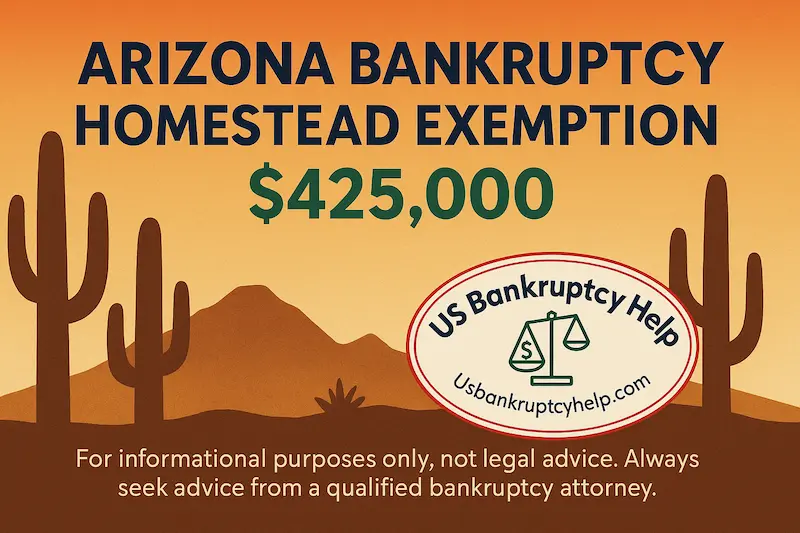
It is important to note that homestead exemptions change over time and it is always a good idea to seek legal counsel to be sure of the homestead exemption in Arizona, before taking any action.
Key Benefits of Arizona Homestead Protection
Arizona homestead protection offers several key benefits for homeowners seeking financial security. This legal provision acts as a financial shield, preventing forced sales due to unsecured debts. By securing a portion of your home's equity, it provides peace of mind amid financial uncertainty.
Arizona Homestead Exemption in Bankruptcy
In bankruptcy cases, Arizona has long operated under an “opt-out” system, meaning AZ state laws define the exemption amounts rather than federal standards. You must be a resident of Arizona for a minimum of 730 days to use Arizona exemptions. At the moment, the AZ homestead exemption stands at $425,000, with further increases tied to cost-of-living adjustments. This protection covers equity in your primary residence, be it a detached house, condominium, mobile home, or manufactured home. Notably, vacation properties, rental units, and RVs (motor homes) do not qualify.
The primary goal is to ensure you and your family remain housed despite creditor actions stemming from unsecured debts. However, some obligations—like mortgages, HOA fees, taxes, and family-support judgments—stand outside the exemption’s protective scope. Additionally, if you purchased your home less than 1,215 days before filing (approximately 3 years and 4 months), federal law may cap your protected equity, overriding the higher state limit.
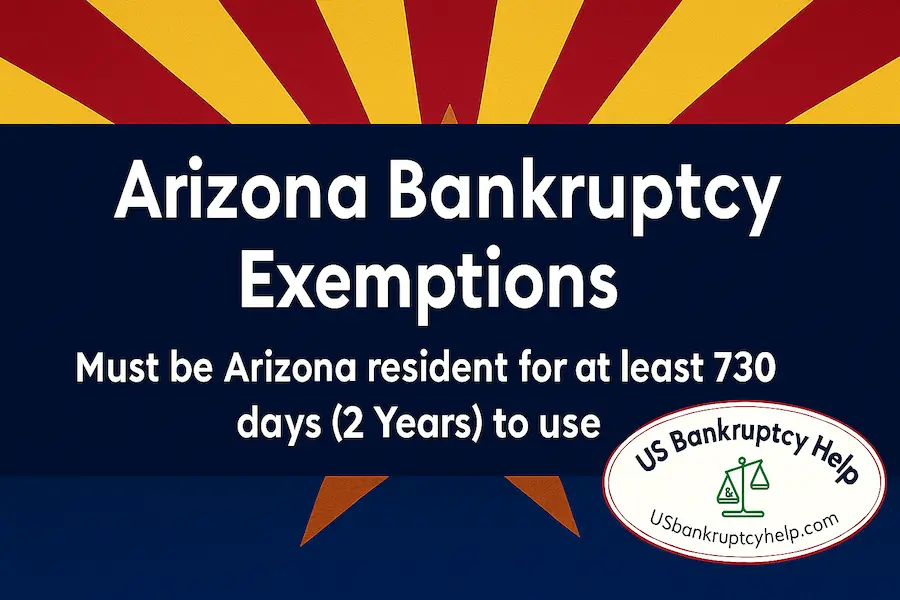
How Arizona Homestead Laws Work
Arizona homestead laws are designed to shield homeowners' home equity. Essentially, they provide a legal framework that helps protect the equity in your home. This protection is crucial for maintaining financial security.
Equity is the difference between your home’s market value and the outstanding balance of any mortgages or liens. For instance, if your house appraises at $500,000 and you owe $200,000, your equity is $300,000. Because this amount falls below Arizona’s exemption threshold, you’d likely keep your home in a Chapter 7 scenario, provided other rules (like the 1,215-day requirement) are satisfied.
Getting an accurate valuation is key. Real estate websites can offer a ballpark figure, but if you suspect your home is near or over the limit, a professional appraisal or a realtor’s market analysis is often more reliable. The Arizona Homestead Exemption statute typically looks to the final closing document for actual sale or refinancing transactions, but for bankruptcy planning, appraisals provide clarity.
Appreciation Risk in an Open Bankruptcy Case
Even if your equity is secure when you file, the situation can change if the property appreciates while your bankruptcy case remains open. Any rise in value above the exemption amount might belong to the bankruptcy estate, potentially giving the trustee grounds to sell your home. In most Chapter 7 cases, trustees aim to close quickly, reducing this risk. However, if delays or legal disputes extend the timeline, the chance of appreciating real estate poses real concerns.
To mitigate this, some homeowners or attorneys file motions to abandon the property or negotiate with the trustee to encourage a prompt closure of the estate. Communication is paramount: if you realize the housing market is booming, proactively discuss options with your attorney to protect that extra equity.
Selling Your Homestead
Selling your homesteaded property doesn’t immediately remove the exemption. State law generally safeguards sales proceeds for up to 18 months, provided you intend to reinvest in another primary residence. This does not include funds pulled out from refinancing your home, since that’s not considered a sale. For instance, if your home is sold and you walk away with $300,000, that money retains its protected status while you search for another home, so long as you use it toward a new homestead within the 18-month window.
Comprehensive Arizona Bankruptcy Guidance & Resources
Expert insights and clear information to guide you through bankruptcy in Arizona, from Phoenix and Tucson to every community statewide.
Do You Have to Claim Arizona Homestead?
Arizona homestead is automatic. Arizona law automatically extends the homestead exemption to eligible homeowners. A formal homestead declaration, however can solidify your claim, especially if questions arise. This declaration, recorded with the county, clarifies that your home is your primary residence and underscores your legal right to protection.
For example, if your property arrangement is atypical—like co-owned land or a non-traditional dwelling—a recorded declaration eliminates ambiguity. It also serves as persuasive evidence if a creditor disputes your homestead status in court. While it may seem a minor formality, the Homestead Declaration can act as another layer of security, particularly in complex or contested bankruptcy proceedings.
A Practical Example of Arizona Homestead Exemption Application
Suppose you have a home valued at $500,000 with $200,000 remaining on the mortgage. Your $300,000 equity is well below the$425,000 homestead threshold, so if you file Chapter 7, the trustee likely won’t attempt to sell the house, given no additional equity exists for unsecured creditors. However, imagine the market surges within six months, and your house is suddenly worth $600,000. Now, your equity sits at $400,000. While you might still be within the cap, one more jump in value could push you over. In such cases, swift resolution of the bankruptcy could protect you from a forced sale.
Steps to Maximize Your Homestead Protection
To make the most of the homestead exemption, consider the following steps:
Keep Your Information Updated
While the exemption is automatic, ensure that your property records reflect that the home is your primary residence. This can be crucial if your residency is ever questioned. Regularly verifying your property records can prevent disputes and ensure seamless access to protection when needed. Additionally, keeping your records current can facilitate smoother transactions if you decide to sell or refinance your home.
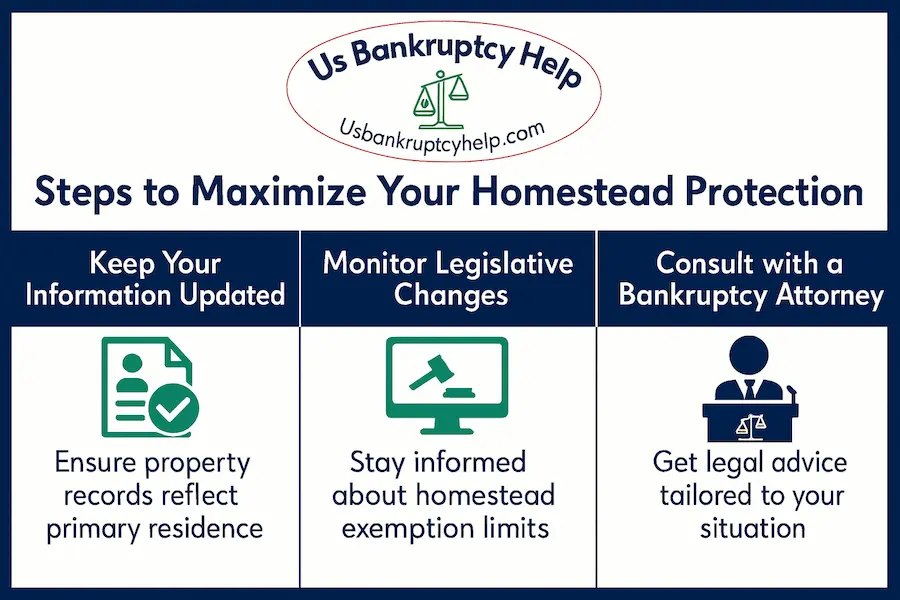
Monitor Legislative Changes
The homestead exemption amount can change based on new legislation. Stay informed about any changes to ensure you know the current protection limits. Subscribing to legal updates or consulting with a real estate professional can keep you informed about legislative shifts that may affect your protection. Being proactive about these changes ensures that you are always aware of your rights and the level of security you can expect.
Consult with a Bankruptcy Attorney
If you're facing financial difficulties or have questions about your specific situation, consulting with a legal expert can provide clarity. They can offer guidance tailored to your circumstances and help you understand how the homestead exemption can work for you. Legal experts can also assist in navigating complex situations, ensuring that you fully leverage the benefits of the exemption. By seeking professional advice, you can make informed decisions that protect your home and financial well-being.
Weighing Chapter 7 vs. Chapter 13
The Homestead Exemption applies in both Chapter 7 and Chapter 13 bankruptcies, but the practical outcomes differ. With Chapter 7, any non-exempt equity can trigger liquidation; with Chapter 13, you can propose a repayment plan that accounts for non-exempt equity, often letting you keep your home while you catch up on mortgage arrears or pay off a portion of unsecured debts. Understanding how the Homestead Exemption interacts with your broader financial circumstances is crucial—this is where a bankruptcy attorney’s guidance is invaluable.
Common Misconceptions About Arizona Homestead
There are several misconceptions about the homestead exemption in Arizona that are important to clarify:
Misconception 1: It Eliminates All Debt
The homestead exemption does not eliminate debt; it simply protects your home from being used to satisfy certain debts. It's important to understand that while your home is protected, you remain responsible for managing and repaying your debts. This distinction is crucial for setting realistic expectations about the scope of the exemption's protection.
Urgent Bankruptcy Help for Arizona Residents
Take immediate action to protect your home, vehicle, and income from foreclosure, repossession, and wage garnishment. Solutions tailored specifically for Arizona residents.
Misconception 2: It Requires Filing Paperwork
In Arizona, the homestead exemption is automatic. You do not need to file paperwork to receive protection for your primary residence. This automatic feature simplifies access to protection, but it's still beneficial to understand the process and your rights under the law. Knowing that no additional steps are required can provide peace of mind and confidence in the exemption's coverage.
Misconception 3: It Covers All Property Types
The exemption only applies to your primary residence. Investment properties or vacation homes are not covered. Understanding this limitation is essential for homeowners with multiple properties, as they may need to explore other strategies to protect their additional real estate investments. Being aware of what is and isn't covered can help you make informed decisions about your property portfolio.
Real-World Arizona Homestead Exemption Examples (Good & Cautionary)
Example 1 — Phoenix homeowner keeps the house in chapter 7 (under the cap)
Maria owns a Phoenix home worth $520,000 with a $210,000 mortgage. Her equity is $310,000, which is below Arizona’s indexed homestead limit (about $425,200 for 2025). She’s current on the mortgage but has $62,000 in credit cards and medical bills. Maria files chapter 7. Because her equity is fully exempt and she stays current on payments, the trustee has no reason to sell the home. Her unsecured debts are discharged, freeing cash flow to maintain the mortgage.
- Why it worked: Equity < homestead cap, mortgage current, no big non-exempt assets.
- SEO takeaway: “Arizona homestead exemption protects home equity in chapter 7 when you’re under the cap.”
Example 2 — Tucson couple recently bought; 1,215-day federal cap creates non-exempt equity
David and Priya purchased their Tucson home 900 days before filing. The home is worth $610,000 with a $260,000 mortgage, leaving $350,000 equity. Although Arizona’s homestead limit would normally cover that, the 1,215-day federal rule caps how much homestead they can claim on a recently acquired residence (about $214,000 as of 2025). The difference—roughly $136,000—is non-exempt in chapter 7, so a sale or a buyout would be on the table. Instead, they choose chapter 13: they keep the home and structure payments that return the non-exempt value to creditors over 3–5 years, while staying current on the mortgage.
- Why it’s cautionary: The federal 1,215-day cap overrode the larger Arizona limit because the purchase was recent. This is an example of why you have to know exactly what you are doing with exemptions. If the couple had field chapter 7, they may have lost their home. Always hire a local bankruptcy attorney.
- Takeaway: Arizona homestead exemption vs. 1,215-day federal cap—when recent buyers should consider chapter 13.
Example 3 — Mesa seller protects (or loses) homestead sale proceeds depending on handling
Jordan sells a Mesa primary residence and nets $300,000 in proceeds. Arizona generally protects homestead sale proceeds for up to 18 months if you intend to reinvest in a new primary residence and keep the funds traceable. In the best-practice path, Jordan puts the money in a separate account titled “homestead sale proceeds” and buys a new home within a year—creditors can’t grab those funds while properly protected. In the bad-outcome path, Jordan commingles the money with everyday spending and waits past 18 months; a judgment creditor then levies the account because the proceeds protection expired and tracing is unclear.
- Why it’s mixed: Proceeds protection exists—but only if you segregate funds and reinvest on time.
- Takeaway: “Arizona homestead proceeds protected for 18 months if kept separate and used for a new primary home.”
Arizona Homestead Exemption: Protecting Your Home Equity from Financial Hardship
The Arizona homestead exemption is an invaluable tool for homeowners, providing crucial protection in times of financial distress. By understanding its features, limitations, and how to apply it effectively, you can ensure your home remains a haven, even when facing economic challenges. Keep informed about legislative changes, and consult with legal professionals to maximize your protection. By leveraging the Arizona homestead exemption, you can secure peace of mind knowing that your most significant investment—your home—is safeguarded against unforeseen financial hardships.
In a world where financial stability can be unpredictable, the homestead exemption serves as a vital resource for homeowners looking to protect their primary residence. By proactively managing your rights and responsibilities under this law, you can navigate financial difficulties with confidence and security.
Frequently Asked Questions (FAQs) About the Arizona Homestead Exemption
What does the Arizona homestead exemption actually protect—and what does it not cover?
The Arizona homestead exemption protects a portion of your home equity in your primary residence from most unsecured creditors. It does not stop a mortgage lender, HOA with a valid lien, or tax authorities from enforcing their rights, and it doesn’t erase debts by itself. If you’re dealing with mortgage arrears, a chapter 13 plan may help you catch up while the homestead safeguards your equity.
How much equity is protected under the Arizona homestead exemption?
Arizona protects home equity up to the current indexed limit (raised by Proposition 209 and adjusted for inflation each year). To estimate protection, subtract all mortgages and liens from your home’s fair market value. If the equity is under the indexed cap, it’s generally shielded from most unsecured creditors. Because the cap is indexed, confirm the latest figure; for 2025 many homeowners reference a limit of about $425,200.
Do I need to file a Homestead Declaration, or is protection automatic?
Protection is typically automatic for your primary residence, so most homeowners don’t need to file anything. That said, recording a Homestead Declaration can reduce disputes in edge cases (for example, co-owned property, a manufactured home on leased land, or unusual occupancy situations). If your situation is atypical, consider filing the declaration and keeping proof of occupancy on hand.
What happens if I sell my homestead—are the proceeds protected?
In many scenarios, sale proceeds from your homestead remain protected for up to 18 months if you intend to reinvest in a new primary residence and you keep the funds identifiable and separate. Refinancing proceeds are different—they’re generally not treated as “sale” proceeds and don’t carry the same protection. If you plan to sell, talk with counsel about best practices to preserve protection on your funds and timing for your next purchase.
How does the homestead exemption interact with bankruptcy (chapter 7 vs. chapter 13)?
The exemption applies in both chapters, but it works differently in practice. In chapter 7, non-exempt equity (equity above the cap) can put the home at risk; if your equity is fully covered, you can often keep the house if you stay current on the mortgage. In chapter 13, you typically keep the home and pay any non-exempt equity through a 3–5 year plan. Note two federal timing rules: the 1,215-day cap can limit homestead protection if you bought the home recently, and the 730-day residency rule can affect which state’s exemptions you can use. A quick consult can clarify which rules apply to your facts.
How long do you have to live in Arizona to be able to claim or use the Arizona homestead exemption?
You must have lived in Arizona for at least 730 days to claim Arizona bankruptcy exemptions, therefore you must have lived in Arizona at least 730 days to claim the Arizona homestead exemption.
Explore Our Arizona Bankruptcy Guides
Explore More National Bankruptcy Guides
Explore Bankruptcy Help by State
Browse our state guides to learn exemptions, means test rules, costs, and local procedures. Use these links to jump between states and compare your options.
- Arizona
- California
- Colorado
- Florida
- Georgia
- Illinois
- Indiana
- Maryland
- Michigan
- New York
- Ohio
- Oregon
- Pennsylvania
- Tennessee
- Texas
- Virginia
- Wisconsin